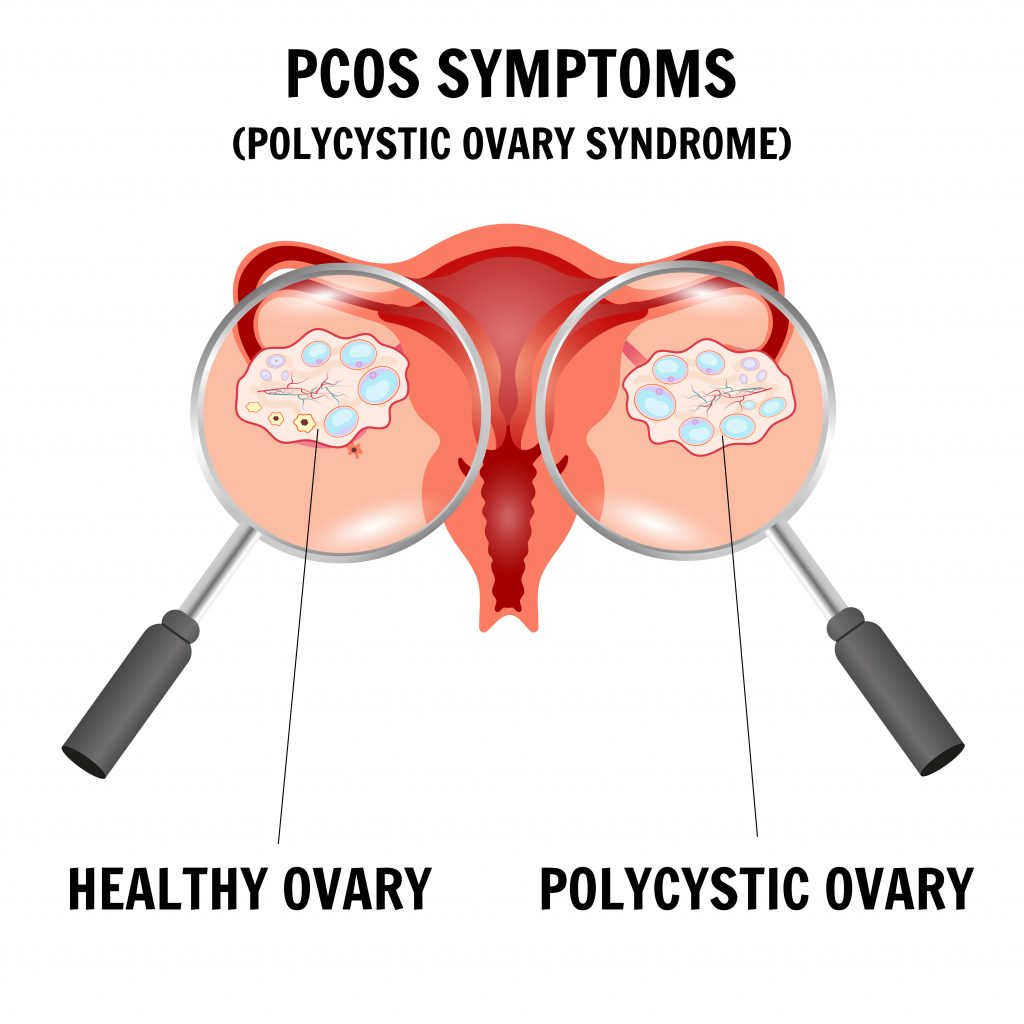5th floor, Lakshmi Sharada Arcade,
6th Main Road, No 251,
17th Cross Road,Sector 7,
HSR Layout,Bangalore,
Karnataka-560102

Living with PCOS can be challenging, disrupting your cycle, worsening acne, and causing weight gain. Despite the difficulty in losing weight, you're not alone. Simple lifestyle changes can ease your PCOS weight loss journey.
Optimize your diet: A balanced diet forms the core of a healthy lifestyle. Seeking guidance from a nutritionist or dietitian can aid in tailoring your eating habits, particularly if you face challenges initiating changes or have conditions like metabolic syndrome. Emphasize healthy fats, whole grains, and fresh produce to reduce chronic inflammation and support long-term weight management.

Focus on Fiber: Fiber helps you feel fuller for longer on fewer calories. Furthermore, complex, high-fiber carbs do not boost blood sugar (and hence cause greater food cravings) in the same way that simple, sweet carbs do. If you have PCOS, eating more fiber foods may be very useful. According to one study, a higher fiber diet is associated with decreased belly fat and insulin resistance in women with PCOS (https://pubmed.ncbi.nlm.nih.gov/30449604/).
Reduce your Carb Intake: Because carbs affect insulin levels, reducing your carb consumption may help you control PCOS. Insulin resistance is a condition in which your cells do not respond appropriately to the hormone insulin. Insulin is required by your body for blood sugar management and energy storage. High insulin levels have been linked to increased body fat and weight gain in both the general population and persons with PCOS, according to research (https://www.ncbi.nlm.nih.gov/pmc/articles/PMC5487935/). People with obesity, PCOS, and insulin resistance in one trial followed a 3-week diet of 40% carbs and 45% fat, followed by a 3-week diet of 60% carbs and 25% fat. During each phase, protein consumption was 15% of total daily calories. While blood sugar levels were equal throughout the two diet stages, insulin levels dropped by 30% during the lower carb, greater fat phase (https://pubmed.ncbi.nlm.nih.gov/27910718/).

Get Enough Protein: A protein-rich diet can minimize food cravings and keep you feeling fuller for longer than a carbohydrate- or fat-rich diet. Protein can also increase blood sugar levels and raise your metabolism, which are both beneficial when it comes to losing weight (https://academic.oup.com/ajcn/article/95/1/39/4576669). Almonds, Greek yoghurt, eggs, lean poultry and muesli are all good sources of protein. If you know you're deficient in protein, establish a diary to measure your progress. Protein should make up roughly 30% of your regular diet.
Eat Healthy Fats: Healthy fats can help keep you full, especially if you're attempting to limit your carb intake. According to a 2015 study published in the Journal of Nutrition, women with PCOS who ate a higher fat diet lost more weight over eight weeks than women with PCOS who ate a lower fat diet (https://pubmed.ncbi.nlm.nih.gov/25527677/). Try including 200 calories of healthy fats in each meal, such as two tablespoons of olive oil or half an avocado.

Keep Stress in Check: We all know that it is much easier stated than done. Cortisol levels rise in response to stress, which has been related to weight gain. Chronic stress can cause your stomach to store extra fat, so attempting to reduce that stress—whether through deep breathing, meditation, yoga, sleep, or other forms of self-care—can only help (https://pubmed.ncbi.nlm.nih.gov/24918858/).
Reduce Caffeine: Caffeine has a significant impact on hormone levels. Caffeine consumption has been proven in studies to interfere with ovulation and elevate stress hormones, which can lead to hormonal abnormalities. Caffeine is probably best avoided, but if you must have it, do it after eating something else (to lessen its impact on your blood sugar) and try to limit yourself to one serving or cup per day (https://academic.oup.com/clinchem/article/54/9/1489/5628649?login=false).

Eat fermented foods: Women with PCOS may have fewer beneficial gut bacteria than women who do not have the disorder, which could explain why they struggle with weight gain (https://pubmed.ncbi.nlm.nih.gov/29897462/). Making an attempt to introduce more beneficial bacteria into your system may be beneficial. Even if you don't have PCOS, new research suggests that adding probiotics to your diet can help you lose weight. To gain the benefits of fermented foods, include one every day in your diet or take a probiotic supplement.
Get enough Sleep: Long-term PCOS weight loss requires adequate rest. For most adults, that equates to 7-9 hours. Maintain a consistent sleep routine (go to bed at the same time every night), Maintain a peaceful sleeping environment. Don't consume anything within 2 hours of going to bed. Reduce your alcohol consumption and avoid using alcohol as a sleep aid (it promotes more restless sleep even if you fall asleep faster).

Practice Mindful Eating: People with PCOS are three times as likely to have eating issues than those who do not have PCOS (https://pubmed.ncbi.nlm.nih.gov/29947018/). One such answer is mindful eating. It raises awareness of physical cues such as hunger and fullness. Mindfulness-based approaches to food may aid in the treatment of potentially harmful eating behaviors, including binge eating and emotional eating. According to research, mindful eating practices may be connected to weight loss (https://pubmed.ncbi.nlm.nih.gov/31368631/).
Exercise Regularly: It's a good idea to get at least 150 minutes of physical activity every week (at least 20 minutes per day) if you have PCOS. Resistance exercise in particular has been associated with improved PCOS outcomes. This does not necessarily imply weightlifting; you can create stronger muscles by using your own body weight. In a 2015 study of women with PCOS, high-intensity interval training (HIIT) improved insulin resistance and body composition (https://www.ncbi.nlm.nih.gov/pmc/articles/PMC4583183/).
Weight loss can be challenging for those with PCOS. Opt for a balanced, nutritious diet with whole foods, protein, healthy fats, and fiber. Minimize inflammatory items like refined carbs. Consider beneficial vitamins and address lifestyle factors, including regular exercise, stress management, and adequate sleep. Implementing these suggestions may help in your weight loss journey with PCOS.